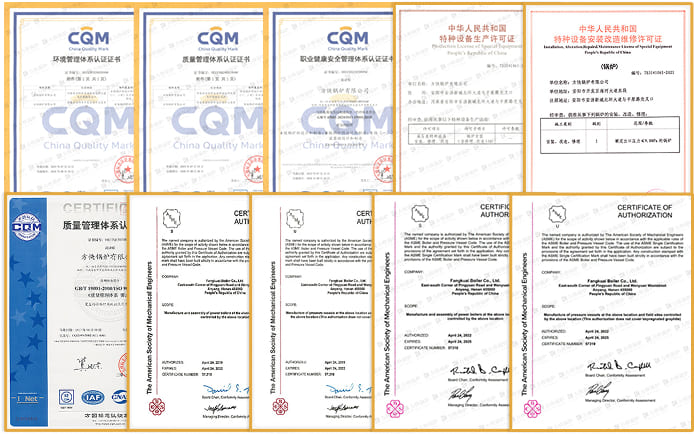Here is a comprehensive overview of internationally recognized boiler pressure classification standards, synthesized from major global technical specifications (ASME, ISO, EN):
I. International Power Plant Boiler Classification
Widely adopted in energy sectors worldwide, based on steam outlet pressure:
| Pressure Class | Pressure Range | Typical Parameters | Primary Standards |
|---|---|---|---|
| Low Pressure (LP) | ≤2.5 MPa (≤36.3 psi) | Steam temp ≤400°C | ASME Sec I, ISO 16528 |
| Medium Pressure (MP) | 2.5–6.0 MPa (36.3–87 psi) | Pressure: 3.8–5.9 MPa, Temp: 450°C | EN 12953, ISO 16528 |
| High Pressure (HP) | 6.0–13.0 MPa (87–188.5 psi) | Pressure: 9.8–12.8 MPa, Temp: 540°C | ASME BPVC Sec I , EN 12952 |
| Very High Pressure (VHP) | 13.0–16.7 MPa (188.5–242 psi) | Temp: 540–555°C | ASME Sec I |
| Subcritical | 16.7–22.1 MPa (242–3,206 psi) | Pressure: 16.7–19.6 MPa, Temp: 540–570°C | Global consensus |
| Supercritical | ≥22.1 MPa (≥3,206 psi) | Pressure: 25–31 MPa | ASME Sec III, ISO 16528 |
Key Notes:
- HP threshold: 6.0 MPa internationally vs. 9.8 MPa in China.
- Critical pressure: Universally defined as 22.1 MPa, where water/steam densities converge, enabling 40%+ thermal efficiency .
II. ASME BPVC Equipment Risk Classification
Mandatory for North America and globally referenced:
- Section I (Power Boilers): ≥6.0 MPa. Requires creep-resistant alloys (e.g., SA-387 Gr.91), full-penetration welds, and NDT.
- Section IV (Heating Boilers): ≤2.5 MPa. Permits carbon steel and simplified designs.
- Section VIII (Pressure Vessels):
- Div. 1: 0.1–20 MPa (conventional design)
- Div. 2: 20–70 MPa (advanced design)
- Div. 3: >70 MPa (e.g., hydrogen systems)
III. EU EN Standards Special Requirements
Adds efficiency and emission mandates:
- HP Boilers (≥6.0 MPa): Must integrate oxygen trim systems (zirconia probes) and achieve ≥94% thermal efficiency.
- Supercritical Boilers: Subject to IED emission limits (NOx ≤200 mg/m³).
Scientific Basis for Pressure Thresholds
- 6.0 MPa: ASME-mandated safety certification threshold for high-risk equipment.
- 10.0 MPa: Transition to chromium-molybdenum alloys (e.g., P91/P92) for 540°C creep resistance.
- 22.1 MPa: Thermodynamic critical point for single-phase fluid operation.
Regional Implementation Examples
| Region/Application | Dominant Standard | Typical Pressure Selection |
|---|---|---|
| North American power plants | ASME Sec I + EPA rules | Subcritical (16.7–22.1 MPa) |
| EU district heating | EN 12953 | MP hot-water boilers (2.5 MPa) |
| Asian industrial plants | ISO 16528 + ASME | HP range (6.0–13.0 MPa) |
Conclusion
Globally, boiler pressure classes are defined by:
- Power plant standards (ISO/ASME): HP starts at 6.0 MPa, subcritical at 16.7–22.1 MPa.
- Safety codes (ASME BPVC): Section I certification required ≥6.0 MPa.
- Material transitions: ≥10.0 MPa necessitates high-temperature alloys.
For cross-border projects, prioritize ASME or EN-certified designs to ensure compliance with local regulations (e.g., EPA, IED).
Data synthesized from ASME BPVC 2025 , ISO 16528 , EN 12952/12953 , and global pressure vessel classifications .
Get your best price
Quickly compare 3 FREE quotes
- Engineer quick quote
- The overall delivery speed is fast
- Financial choice
- Low installation costs and cost savings
25 years+ of boiler R&D
More than 20 innovative technologies

